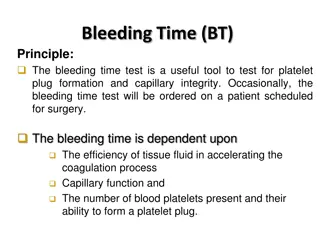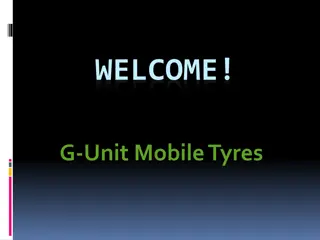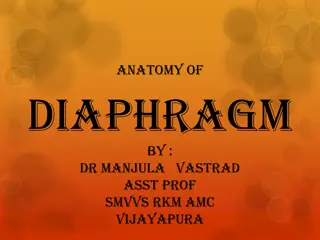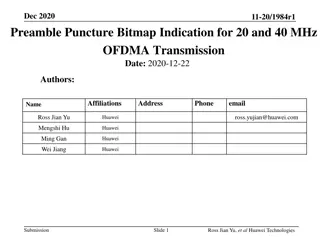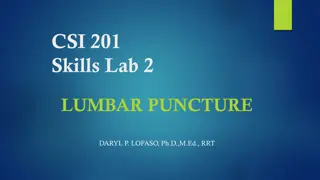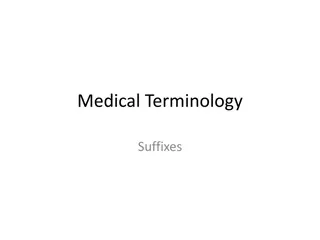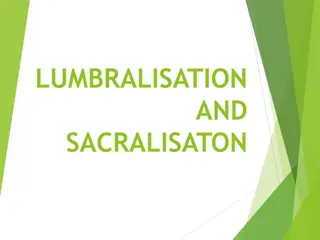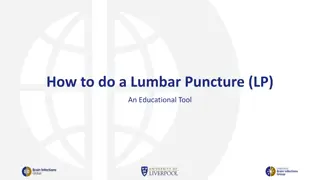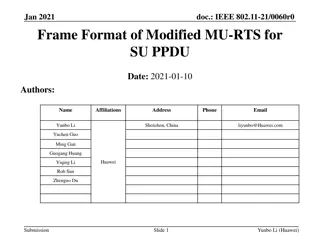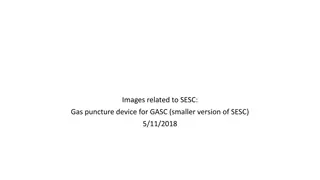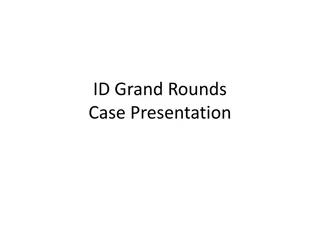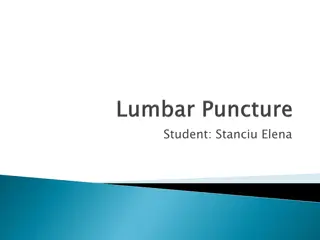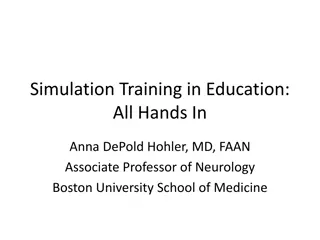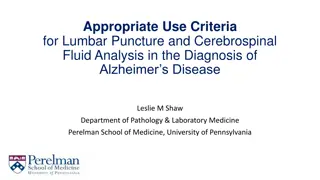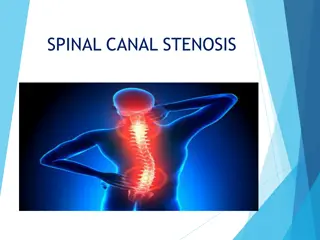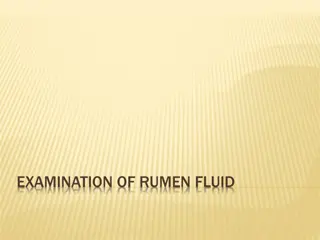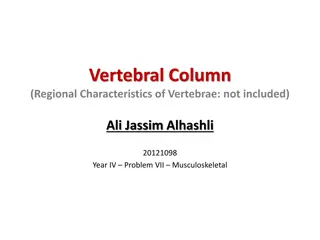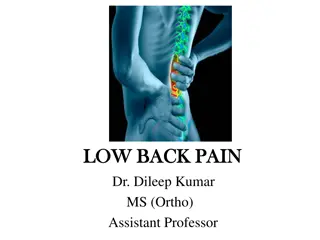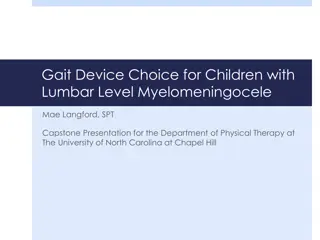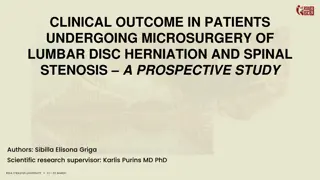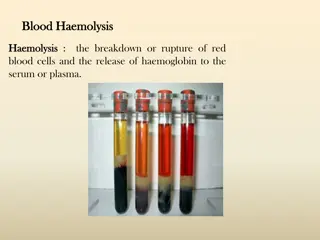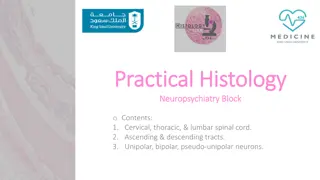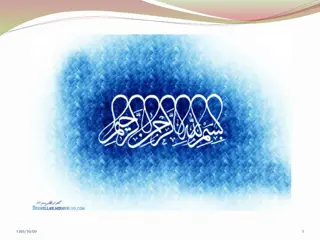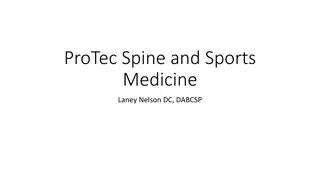Understanding Bleeding Time and Coagulation Time Tests
The Bleeding Time (BT) test evaluates platelet plug formation and capillary integrity, crucial for surgery preparations. Prolonged bleeding times indicate low platelet count or dysfunction. The Duke method is one way to determine Bleeding Time. Sources of error, such as medication interference, impr
5 views • 8 slides
Understanding Hydrocollator Packs for Moist Heat Therapy
Hydrocollator packs are a form of superficial heat modality that utilize moist heat to transfer energy to the skin through conduction. These packs, filled with silica gel like bentonite, provide soothing heat for 30-40 minutes when heated in a hydrocollator unit. They come in various sizes and shape
8 views • 11 slides
One of the Best Emergency Tyre Repair in Church
365 Mobile Tyres serves the Best Emergency Tyre Repair in Church. Their services include: puncture repair, emergency tyre repair, wheel nut removal and much more. They cover all areas of Lancashire and Greater Manchester. With a vast selection of brand new tyres from all makes and types, they ensure
0 views • 6 slides
Best Emergency Tyre Replacement in Stopsley
G-Unit Mobile Tyres serves the Best Emergency Tyre Replacement in Stopsley. They bring their expertise and equipment directly to your doorstep, providing hassle-free tyre fitting services wherever you are. As well as replacing worn tyres, they also offer a puncture repair service, and an emergency t
0 views • 6 slides
Anatomy of the Diaphragm: Structure, Function, and Clinical Relevance
The diaphragm, a key muscle of respiration, separates the thoracic and abdominal cavities and plays a crucial role in breathing. This dome-shaped musculofibrous partition originates from various structures such as the xiphoid process, lower ribs, and lumbar vertebrae. Its actions are essential for t
1 views • 29 slides
Bitmap Indication for OFDMA Transmission
Dec. 2020 introduces a preamble puncture bitmap indication for 20/40 MHz OFDMA transmission, proposing to use '1111' when no puncturing is applied. The straw poll suggests adding this indication to the TGbe SFD. The submission highlights the specific bit values for punctured 20 MHz channels within a
2 views • 5 slides
Lumbar Puncture Procedure Overview
Understand the indications and contraindications, checklist, equipment required, needle passage layers, consent procedures, CSF testing, and key steps like patient positioning for a lumbar puncture. Learn about obtaining CSF, administering medications, measuring ICP, diagnosing CNS infections, and m
0 views • 13 slides
Understanding Post-Dural Puncture Headache in Children
Post-dural puncture headache (PDPH) is a common complication following lumbar puncture, characterized by a positional headache that worsens when upright and improves when lying flat. This article discusses the epidemiology, etiology, diagnosis, risk factors, management, and treatment of PDPH in chil
0 views • 30 slides
Understanding Medical Terminology: Suffixes in Pathology and Procedures
Explore how suffixes play a crucial role in medical terminology by indicating procedures, conditions, and diseases. Delve into suffixes related to pathology, such as -algia for pain, -itis for inflammation, and -megaly for enlargement, as well as procedure-related suffixes like -centesis for surgica
0 views • 11 slides
Understanding Lumbarisation and Sacralisation in Human Spine
The human spine comprises the cervical, thoracic, lumbar, sacral, and coccyx vertebrae. Lumbarisation refers to the non-fusion of the uppermost sacral segment, while sacralisation involves fusion of the fifth lumbar vertebra with the sacrum. Lumbarisation can cause issues such as back pain, inflamma
0 views • 14 slides
Lumbar Puncture (LP) Educational Tool Overview
This educational tool provides information on how to perform a lumbar puncture (LP) for brain infections. It covers learning objectives, contraindications, and steps involved in the procedure. The content includes visuals and notes to enhance understanding and adaptation.
0 views • 26 slides
IEEE 802.11-21/0060r0 Jan. 2021 Modified MU-RTS Frame Format
This document discusses the frame format and structure of a modified MU-RTS (Request to Send) used in IEEE 802.11 standards for transmitting non-TB (Trigger-Based) PPDUs. The modified MU-RTS allows an Access Point (AP) to allocate time for a target Station (STA) to transmit Single User (SU) PPDUs wi
0 views • 10 slides
Understanding Echinococcosis: Symptoms, Transmission, and Treatment
Echinococcosis, a zoonotic disease caused by tapeworm parasites, has various forms such as cystic and alveolar echinococcosis. The disease is transmitted to humans through contaminated soil, water, or food. Diagnosis involves imaging techniques and serologic tests. Treatment options include surgery,
0 views • 9 slides
SESC Gas Puncture Device for GASC - Images Collection
Collection of images showcasing a gas puncture device used for GASC, including assembly, puncture tip close-ups, and operational demonstration. Images highlight the device's components and usage, from sealing protection to sample collection. The series illustrates the process and components involved
0 views • 4 slides
Confusion and Stroke: A Challenging Case Presentation in the Emergency Department
A patient with a history of cerebral aneurysm presented to the Emergency Department with confusion and hiccups. Despite initial stability, imaging revealed findings suggestive of a possible stroke. Further studies including cEEG and lumbar puncture were performed. The MRI findings indicated restrict
0 views • 11 slides
Lumbar Puncture: Procedure, Complications, and Clinical Applications
Lumbar puncture, also known as LP, is an invasive procedure used to obtain cerebrospinal fluid (CSF) for diagnostic and therapeutic purposes. This procedure has a long history dating back to ancient times, with modern techniques developed in the late 19th century by Heinrich Quincke. LP is crucial f
2 views • 11 slides
Lumbar Puncture: Indications, Contraindications, and Post-procedure Considerations
Lumbar puncture is a medical procedure involving the insertion of a needle into the spinal subarachnoid space to collect cerebrospinal fluid for diagnostic or therapeutic purposes. Indications for performing a lumbar puncture include suspicion of meningitis, subarachnoid hemorrhage, CNS diseases lik
0 views • 17 slides
Simulation Training in Education: Enhancing Learning Through Hands-On Simulation
Hands-on simulation training in education provides students with valuable learning experiences by increasing self-reported knowledge and technical proficiency. Simulations help improve students' knowledge, experience, and comfort with challenging procedures in a lower-risk environment, leading to en
0 views • 13 slides
Appropriate Use Criteria for Lumbar Puncture in Alzheimer's Disease Diagnosis
Clinicians traditionally diagnose Alzheimer's Disease (AD) based on clinical criteria, but cerebrospinal fluid (CSF) AD biomarkers offer more reliable detection earlier in the disease course. This article discusses the criteria for lumbar puncture and CSF analysis in the diagnosis of AD, highlightin
0 views • 18 slides
Understanding Spinal Canal Stenosis: Causes, Symptoms, and Classification
Spinal canal stenosis is the abnormal narrowing of the spinal canal or intervertebral foramina, leading to compression of nerves and blood vessels. It can result in symptoms such as radiculopathy, claudication, myelopathy, and more. Cervical stenosis presents with arm pain and weakness, while lumbar
0 views • 18 slides
Examination of Rumen Fluid and Methods of Collection
The examination of rumen fluid is crucial for diagnosing rumen diseases and for therapeutic purposes like transfaunation. Various physical and chemical characteristics are analyzed, including color, consistency, pH levels, and sedimentation activity. Abnormal findings indicate different health issue
0 views • 17 slides
Understanding the Vertebral Column and Abnormal Curvatures
The vertebral column, extending from the cranium to the coccyx, plays vital roles in protecting the spinal cord, providing support, and facilitating movement. It consists of 33 vertebrae arranged in 5 regions, each with specific functions and characteristics. The column's curvatures, including cervi
0 views • 12 slides
Understanding Post-Dural Puncture Headache in Children
Discussing the etiology, diagnosis, risk factors, and management of post-dural puncture headache (PDPH) in children. Historical background, neuraxial anatomy, and incidence rates in both adults and children are explored, emphasizing different needle types and gauges influencing PDPH occurrence.
0 views • 30 slides
Understanding Low Back Pain: Causes, Epidemiology, and Management
Low back pain is a prevalent issue affecting adults globally, with lumbar disc disease and poor posture being significant contributors. This condition can result from various factors, leading to discomfort in the lower back region. Understanding the epidemiology, common and uncommon causes, as well
0 views • 61 slides
Gait Device Selection for Children with Lumbar Level Myelomeningocele
This presentation discusses the considerations and choices of gait devices for children with lumbar level myelomeningocele. It covers the specific needs of pediatric patients, benefits and drawbacks of various devices, funding requirements, and clinical application through case studies. The material
0 views • 31 slides
Clinical Outcomes in Microsurgery for Lumbar Disc Herniation: Prospective Study
This prospective study examined the clinical outcomes in patients undergoing microsurgery for lumbar disc herniation and spinal stenosis. The study evaluated the effectiveness of surgical intervention using the Oswestry Disability Index (ODI) and Numeric Rating Scale (NRS) questionnaires preoperativ
0 views • 13 slides
Understanding Blood Haemolysis and Specimen Rejection in Laboratory Testing
Blood haemolysis refers to the release of haemoglobin from red blood cells, affecting test results. Specimen rejection occurs due to various factors like unsuitable conditions, safety hazards, and improper labeling. Capillary puncture technique is used for patients with difficult venous access. Guid
0 views • 8 slides
Practical Histology: Spinal Cord Tracts and Neurons Overview
This practical histology guide covers the cervical, thoracic, and lumbar spinal cord segments, along with ascending and descending tracts, and pseudo-unipolar/unipolar neurons. It emphasizes key features such as the ventral and dorsal horns, gracile and cuneate tracts, and provides essential informa
1 views • 12 slides
Recognizing and Managing Meningitis in Children: Key Points and Procedures
Amidst images of diagnostic criteria and contraindications, this content discusses signs of meningitis in children, the importance of lumbar punctures, and contraindications for immediate LP procedures. It emphasizes key symptoms like nuchal rigidity, altered consciousness, and signs of increased IC
0 views • 41 slides
Best Locking wheel nut Removal in Hafod
If you\u2019re looking for a Locking wheel nut Removal in Hafod, contact Fastest Fit Tyres LTD. Their skilled mobile tyre fitters are available 24 hours a day, ensuring you're never stranded due to a flat or damaged tyre. They specialise in puncture
0 views • 6 slides
Best Puncture Repairs in Soho
If you want the Best Puncture Repairs in Soho, visit Tyres Gear Ltd. They are your go-to tyre service provider in Birmingham. They offer a wide range of high-quality part-worn, budget, branded, used tyres, and new tyres to suit every need and budget.
1 views • 6 slides
Understanding the Role of Multifidus Muscle in Spinal Health
Exploring the multifaceted role of the multifidus muscle in lumbar spine stability and control through histochemical studies and clinical comparisons. Insights into muscle changes with spinal conditions and the importance of maintaining its integrity for overall spinal health are discussed.
0 views • 26 slides
